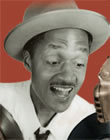
WALKIN' TALKIN' BILL HAWKINS
Written and performed by W. Allen Taylor
| Home |
| Show Info |
| Reviews |
| Bios |
| Photo Gallery |
| Media |
| Contact |
Artist's Statement Since finding out the identity of my father, just a few months after his death in 1975, I had been searching for a way to reconcile my feelings toward him and his absence. It finally came to me that I should use my life’s work in the theatre as a vehicle to accomplish this task. I also realized that the reconciliation would come from getting to know the man... and so my search for information about Bill Hawkins led to the writing of this play. I knew that this project would be would be an emotional journey, but I didn't realize how much of a historical journey it would be. Learning about my father's period on radio and the effect that generation of black radio announcers had on American culture has been fascinating. My father started his radio career in the late forties, at a time when there were less than twenty-five black disc-jockeys on the air nation-wide. Most of them got their start after World War II because the black consumer was being taken seriously for the first time by the white business establishment. Radio stations and advertisers realized that in order to take full advantage of the situation, they needed a black voice to attract and hold the attention of the black consumer market. This economic potential gave black radio disc-jockeys an unique opportunity to develop a "personality" style of announcing that would become as colorful and popular as the music they played. During this time, black disc-jockeys had to hustle. Many of them bought slots of air-time from radio stations and had to go out and find sponsors to buy it. They were trying to make a living, but they must have known that they were in a position to unify and mobilize the black community as never before. It would just be a matter of time before stations that started off with a few hours of black programming per day would become "soul stations"; stations that played pure unadulterated black music and dealt exclusively with black community issues. Obviously, a lot has changed over the years. "Soul stations" are becoming extinct, due to crossover (integration in the music industry) and conglomerate buy-outs. But I am proud to say that my father was a part of creating this rich cultural tradition we call black radio. Finding out specific information about my father has been extremely rewarding and has increased my appetite for more personal insights. But the search has led me to some larger questions as well. What does it mean to be a man? What does it mean to be a father? And where do we learn how to be both? My writing process evolved to include my personal memories of surrogate fathers...men who helped me piece the puzzle of manhood together. Some of these surrogate fathers are portrayed in this piece through storytelling and I feel greatly indebted to them for their insights as well. Many things have happened since I began my search. I have been introduced to several members of my father's family...and therefore my family. And I have received many photographs, and even recordings of his voice. As my play continues to evolve, my journey also continues to progress towards a state of total reconciliation and forgiveness. I am extremely grateful to have found this invaluable vehicle for my personal and transformative passage. My heartfelt thanks to all the many people who have helped me along the way. W. Allen Taylor |